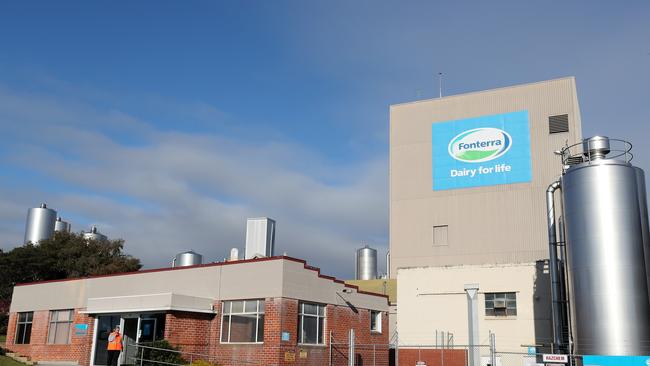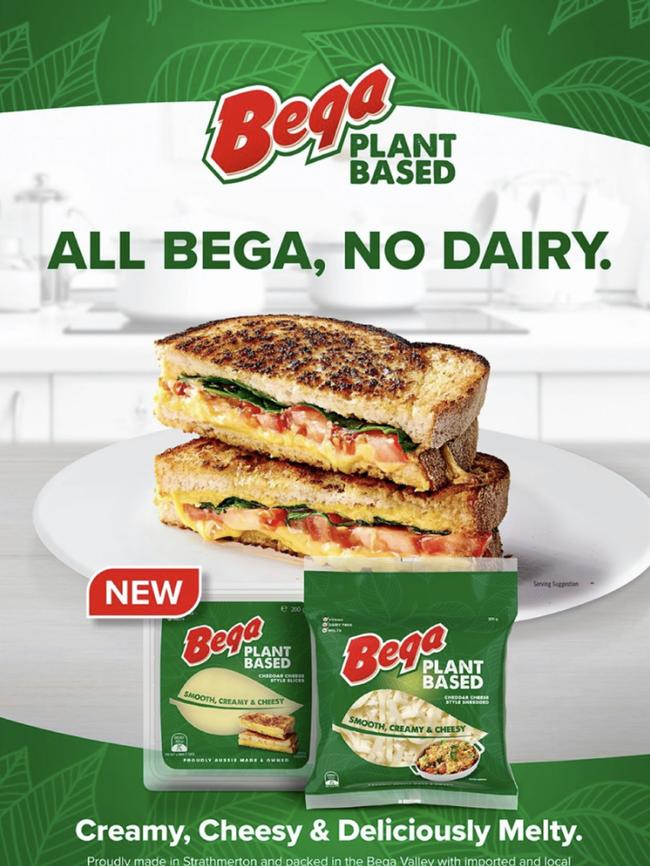Fonterra mulls plant-based options to avoid ‘Kodak moment’ as milk collections slip
Plant-based foods are yet to take ‘significant market share anywhere’, says Fonterra Australia boss René Dedoncker, but he doesn’t want to be blindsided by the rising vegan trend.

Fonterra has been quietly researching plant-based dairy products, with the boss of the New Zealand dairy giant’s Australian arm saying it doesn’t want to have a “Kodak moment”.
The world’s biggest dairy exporter’s potential foray into plant-based milks, cheeses and other products comes after ASX-listed Bega Cheese launched its vegan range, attracting the ire of some shoppers, given its core business remains based on livestock farming.
Fonterra has been watching Bega’s launch closely, considering it still has the exclusive licence to Bega’s cheddar products following a high profile legal stoush two years ago.
Asked about Bega’s move into the plant-based market, Fonterra Australia managing director René Dedoncker stressed that the products were not Fonterra’s under its licensing deal with Bega.
But he said Fonterra “was actively engaged with plant-based from a technology perspective”. Last July at its science, innovation and technology site in Palmerston North, New Zealand, the co-operative began researching plant-based alternatives.
“The reason we do that is that it’s best if you know the potential competitor in that space. So if there are plant-based alternatives, what is the functionality, what would our farmers think of thoses, do they complement milk or not?” Mr Dedoncker said.

“So we are doing are a lot of work in that space just to make sure we are not blindsided. It’s still early days and, in a New Zealand context, there are some plant-based products on the market that we’re looking to pilot, predominantly in the milk space.
“And who knows? What might come of it is a complementary product that supports our farmers and helps create margin. You don’t want to have that Kodak moment.”
Kodak, once a giant in analog photography, was declared bankrupt in 2012 after failing to embrace digital photography quickly enough.
Fonterra has since invested in start-up company DSM, focusing on non-dairy microbial cells to grow protein, fats, enzymes and vitamins. Its move into plant-based products could also provide somewhat of a buffer to Australia’s dwindling milk pool. In the six months to January 31, Fonterra’s Australian milk collections from farmers fell 2 per cent to 66 million kilograms, milk solids.
“The best companies in the world pay attention to the blind spots, and we don’t want this one to sneak up on us,” Mr Dedoncker said.
“So we’re embracing the idea that there could be breakthroughs here (in plant-based dairy alternatives). And the best way to do that is to get involved, so that’s what our science and technology teams are doing.”
The range of plant-based foods has exploded on Australian supermarket shelves in recent years, from the launch of the Bill Gates-backed Impossible Foods to the plethora of nut and grain “milks”. Even Australia’s chief science agency, the CSIRO, has got in on the action, developing a fake meat range with Competitive Foods and Main Sequence Ventures to create v2food.
But Mr Dedoncker said plant-based dairy alternatives were still a niche category and had “not taken significant market share anywhere”. “It’s not disrupting real dairy”.
Indeed, soaring cheese and dairy protein prices have offset the slump in milk collections, fuelling a 25 per cent jump in Fonterra Australia’s interim earnings before interest and tax to $NZ74m. Revenue, meanwhile, vaulted 37 per cent to $NZ1.25bn.
Mr Dedoncker said supermarket price rises accounted for some of the revenue rise, but not all of it.
“Certainly there are price increases in there, but not at the rate of 37 per cent. It’s far more modest than that.
“If you look at our sales volumes, they’re up 5 per cent and those volumes are going into high revenue streams, so that’s contributing to the net shift year-on-year. So it's a combination of those factors.”
Mr Dedoncker also said consumers were sticking by Fonterra’s brands, which include Western Star, Perfect Italiano and Mainland, despite inflation and households budgets coming under pressure from higher interest rates prompting a broader shift to private label products.
“There’s probably a point at which that price elasticity kicks in. But in our category we’ve got great brand equity and that is helping the strength of our performance.
“You may have to use less overtime if affordability is a challenge. But if you’re going to treat yourself, you’re typically going to choose the best … that functionality, taste and texture and the brand. The brand equity that people grew up with makes the difference.”
Fonterra prides itself on its reputation as a brand builder – a status it protects fiercely. It sued Bega after Bega put its own logo on jars of peanut butter when it acquired most of Kraft’s Australian food operations for $460m in 2017.
Fonterra was concerned that Bega’s move breached a 20-year-old deal between the two companies, and it would dilute the Bega brand, which had been synonymous with natural, unprocessed cheese.
But in February 2021, the Victorian Supreme Court allowed Bega to use its brands on other products such as peanut butter, but upheld Fonterra’s exclusive rights to Bega’s trademarks on cheeses.
Across Fonterra’s entire operations, including its core New Zealand market, Australia, Asia, the Middle East and America’s, interim net profit surged 50 per cent to $NZ546m ($507m) while revenue leapt 22.3 per cent to $NZ10.3bn. Interim earnings per share was NZ33c.
But it has cut its guidance for New Zealand farmgate prices to $NZ8.20-$NZ8.80 per kilogram milk solids. This compares with an earlier forecast of $NZ8.50-$NZ9.50. But Australian farmers will be spared the cut, with the co-operative committed to paying them $9.55 a kilogram milk solids for the rest of the season.
It comes as Fonterra had planned to sell its Australian business and its Chile operations as part of a plan to return $NZ1bn to shareholders by next year and focus more on New Zealand milk. But chief executive Miles Hurrell said following review, it decided to retain full ownership of its Australian arm, while offloading its Chilean Soprole business.
This has led to proposing a capital return of NZ50c per share and unit.
“Following completion of the sale of Soprole, we intend to reduce debt and return around 50 cents per share and unit, which is approximately $NZ800m,” Mr Hurrell said.
“We are aiming for a record date for the proposed tax-free capital return in late September 2023, with cash to be received by our farmer owners and unit holders the following month.”
Mr Hurrell was upbeat about the co-operative’s full-year outlook.
“We have full year forecast normalised earnings of NZ55-75c per share, with a midpoint of NZ65c per share.
“There are a number of risks we continue to watch, including the impact of recent weather events in New Zealand on supply chain and milk production.
“Our co-op’s scale, diversity and strong balance sheet positions us well to manage these challenges, and we will continue to prioritise higher value products and channels to deliver sustainable returns for farmer owners and unitholders.”
Fonterra will pay a dividend of NZ10c a share on April 14.






To join the conversation, please log in. Don't have an account? Register
Join the conversation, you are commenting as Logout